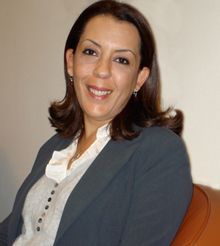
Moroccan Parliamentarian Fatiha Layadi says that reforms to her country’s family law are “revolutionary in terms of women’s rights.” But women there still have a long way to go to reach gender equality.
Layadi delivered the 17th Coca-Cola World Fund Lecture at Yale titled, “Democracy, Islam and Women’s Rights: Ten Years of Political Reform” which also served as the keynote lecture for the Conference on Women, Religion, and Globalization, on November 12 at the MacMillan Center. It focused on the progress made by courageous women working from the bottom up as well as by visionary rulers.
She said the French colonial power wanted to limit girls’ education to primary school, in the name of Moroccan tradition. In 1948, Sultan Mohammed bin Yusef argued in favor of girls’ education through university level.
In 1962, the first Moroccan constitution granted equal political rights to men and women, leading Moroccan women to both vote and run for election, although little progress was made in the first several decades. “Fifty years later,” Layadi said, “I’m standing before you, one of four women elected to the House of Representatives in 2007. Thirty others were elected by a special list, by means of [a] quota.”
In 1998, the government “thought it was time to talk about gender equality,” she said. “The prime minister considered the issue one of his top priorities. Women activists and experts put together a plan to integrate women into national development policies. The plan identified the main fields where reforms were urgently needed: literacy and education; health; economic development; and the status of women in the political, juridical and institutional fields.”
This began the Women’s Decade in Morocco. In 2001, King Mohammed VI set up a special commission to revise family laws, which took two years. “The family code is truly a remarkable landmark in the process of social renovation,” Layadi said. “It does justice to Moroccan women, establishing the principle of equality between men and women within the family framework. It was enacted after an active and open debate that engaged religious and secular forces across Moroccan society.” Adopted by Parliament in 2004, it puts men and women in this predominantly Muslim country on an equal footing in regard to marriage, children, and divorce. It sets the minimum marriage age for women at 18 (though Layadi noted that it’s often disregarded); and enforces sharing of property between married couples.
“Today,” she concluded, “the overall feeling among ordinary Moroccans is that the situation for women has improved in recent years, probably due to public investment in women’s education and women’s growing awareness of their rights.”
